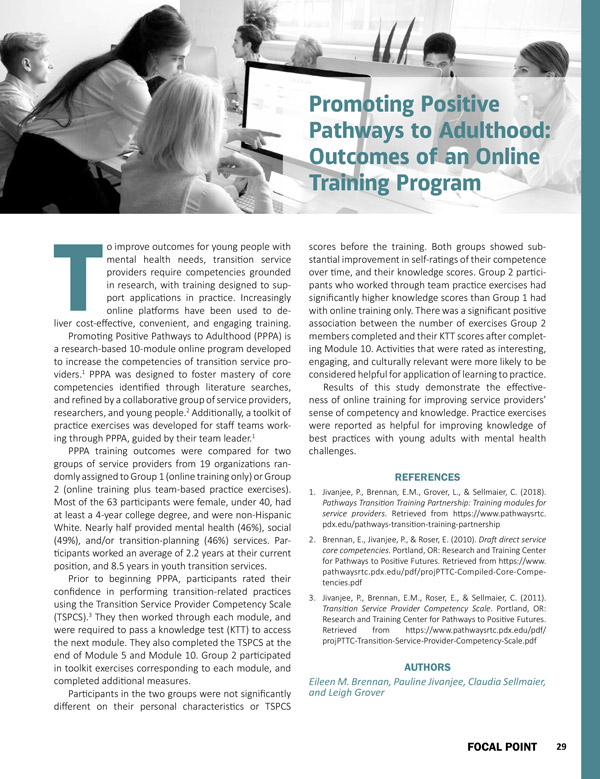
Abstract: This article describes the results of an online training program for transition service providers, and based on the outcomes of the study, identifies best training practices.
"Promoting Positive Pathways to Adulthood: Outcomes of an Online Training Program" (2018)
By Eileen M. Brennan, Pauline Jivanjee, Claudia Sellmaier, & Leigh Grover
To improve outcomes for young people with mental health needs, transition service providers require competencies grounded in research, with training designed to support applications in practice. Increasingly online platforms have been used to deliver cost-effective, convenient, and engaging training.
Promoting Positive Pathways to Adulthood (PPPA) is a research-based 10-module online program developed to increase the competencies of transition service providers.1 PPPA was designed to foster mastery of core competencies identified through literature searches, and refined by a collaborative group of service providers, researchers, and young people.2 Additionally, a toolkit of practice exercises was developed for staff teams working through PPPA, guided by their team leader.1
PPPA training outcomes were compared for two groups of service providers from 19 organizations randomly assigned to Group 1 (online training only) or Group 2 (online training plus team-based practice exercises). Most of the 63 participants were female, under 40, had at least a 4-year college degree, and were non-Hispanic White. Nearly half provided mental health (46%), social (49%), and/or transition-planning (46%) services. Participants worked an average of 2.2 years at their current position, and 8.5 years in youth transition services.
Prior to beginning PPPA, participants rated their confidence in performing transition-related practices using the Transition Service Provider Competency Scale (TSPCS).3 They then worked through each module, and were required to pass a knowledge test (KTT) to access the next module. They also completed the TSPCS at the end of Module 5 and Module 10. Group 2 participated in toolkit exercises corresponding to each module, and completed additional measures.
Participants in the two groups were not significantly different on their personal characteristics or TSPCS scores before the training. Both groups showed substantial improvement in self-ratings of their competence over time, and their knowledge scores. Group 2 participants who worked through team practice exercises had significantly higher knowledge scores than Group 1 had with online training only. There was a significant positive association between the number of exercises Group 2 members completed and their KTT scores after completing Module 10. Activities that were rated as interesting, engaging, and culturally relevant were more likely to be considered helpful for application of learning to practice.
Results of this study demonstrate the effectiveness of online training for improving service providers’ sense of competency and knowledge. Practice exercises were reported as helpful for improving knowledge of best practices with young adults with mental health challenges.
References
- Jivanjee, P., Brennan, E.M., Grover, L., & Sellmaier, C. (2018). Pathways Transition Training Partnership: Training modules for service providers. Retrieved from https://www.pathwaysrtc.pdx.edu/pathways-transition-training-partnership
- Brennan, E., Jivanjee, P., & Roser, E. (2010). Draft direct service core competencies. Portland, OR: Research and Training Center for Pathways to Positive Futures. Retrieved from https://www.pathwaysrtc.pdx.edu/pdf/projPTTC-Compiled-Core-Competencies.pdf
- Jivanjee, P., Brennan, E.M., Roser, E., & Sellmaier, C. (2011). Transition Service Provider Competency Scale. Portland, OR: Research and Training Center for Pathways to Positive Futures. Retrieved from https://www.pathwaysrtc.pdx.edu/pdf/projPTTC-Transition-Service-Provider-Competency-Scale.pdf
Suggested Citation
Brennan, E.M., Jivanjee, P., Sellmaier, C., & Grover, L. (2018). Promoting Positive Pathways to Adulthood: Outcomes of an Online Training Program. Focal Point: Youth, Young Adults, and Mental Health, 32, 29. Portland, OR: Research and Training Center for Pathways to Positive Futures, Portland State University.